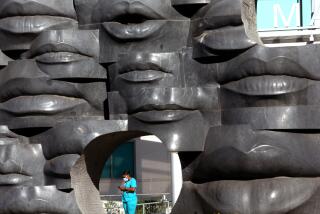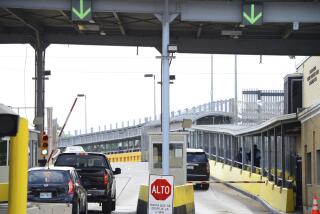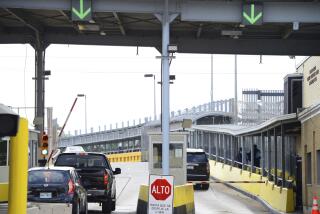Meningitis vaccine being considered for UC Santa Barbara students
State and federal officials are evaluating whether to give students at UC Santa Barbara an unlicensed vaccine to prevent further spread of a bacterial meningitis outbreak on campus.
The California state and Santa Barbara County departments of public health, the U.S. Centers for Disease Control and Prevention and the university confirmed Friday that they are working together to determine if Bexsero, a vaccine against type B meningococcal disease that is not yet approved for use in the U.S., would be effective against the particular type of meningitis that sickened four students in November.
“The university is actively taking all of the necessary steps to ensure access to the unlicensed vaccine if it is recommended by health and medical experts,” UC Santa Barbara officials said in a statement.
The move comes after Princeton University got special permission from the Food and Drug Administration to give Bexsero to students and others deemed to be at risk on its campus. Eight students at the New Jersey school fell ill after infection with a similar, but not identical, strain of the bacterium that sickened the California students.
At UC Santa Barbara, three of the students who fell ill have made full recoveries. The fourth, lacrosse player Aaron Loy, had both feet amputated as a result of the illness.
No new cases have been diagnosed since Nov. 21, the CDC said Friday in a statement.
“We certainly hope that this outbreak is over but are working under the assumption that more cases may occur,” the agency wrote.
Able to pass among people in crowded conditions like dormitories, meningococcal disease strikes quickly and can be deadly, causing the inflammation of the brain lining known as meningitis and multiple complications once it infects the bloodstream, said Dr. T. Warner Hudson, medical director of occupational and employee health for the UCLA Health System and campus. Symptoms include fever, headaches, sensitivity to light, neck stiffness and a blotchy rash.
A vaccine that prevents four types of meningococcal disease — A, C W135 and Y — is administered routinely to children 11 or 12 years old, with a booster offered at 16 to 18, Hudson said.
But it has been difficult to develop a similar vaccine against type B, said UCLA professor of pediatrics Dr. James Cherry.
The meningococcal vaccine currently in use stimulates the body to create antibodies that target a sugar envelope that encases the bacterium that causes the illness. But because the sugar envelope in the type B bacterium is very similar to sugars in various cells in the human body, there have been concerns that a vaccine that worked the same way would stimulate the body to attack its own healthy tissues.
Bexsero avoids that problem by targeting surface proteins in the bacterium instead of the sugar envelope around it, Cherry said.
Before it might be approved for use at UC Santa Barbara, scientists will have to determine if Bexsero will work against the particular microbe detected in the four students there, he added.
To do so, CDC investigators will test Santa Barbara samples and compare their response to Bexsero to that of strains tested during clinical trials of the vaccine.
The agency will also analyze the outbreak, define a target population for possible vaccination and make sure UC Santa Barbara can feasibly store and administer the vaccine, which requires refrigeration.
Two other California universities reported meningitis illnesses this week. Neither has been linked to the Santa Barbara outbreak, according to the California Department of Public Health.
Officials at UC Riverside, which reported Monday that a staff member who worked with students had developed suspected bacterial meningitis, said Friday they had not yet confirmed whether the illness was bacterial or viral.
California Polytechnic State University in San Luis Obispo reported a new student case of viral meningitis Thursday but noted that the infection was “thought to be an isolated incident.”
Viral meningitis is more common, and usually less severe, than bacterial meningitis, UCLA’s Hudson said.
Susan Klein-Rothschild, a spokeswoman for the Santa Barbara County Health Department, said her agency had received calls from worried parents, many wanting to know why their children couldn’t get Bexsero.
“The scientists and the facts will guide the decision,” she said Friday. “I realize it may not be as quick as some would like, but it will probably be faster than it was in Princeton.”
After going through an approval process that lasted several weeks, Princeton provided the first of two Bexsero doses to 5,268 people this week, spokesman Martin A. Mbugua said.
Second doses of the vaccine, needed for maximum protection against the illness, will be available in February.
More to Read
Start your day right
Sign up for Essential California for news, features and recommendations from the L.A. Times and beyond in your inbox six days a week.
You may occasionally receive promotional content from the Los Angeles Times.







